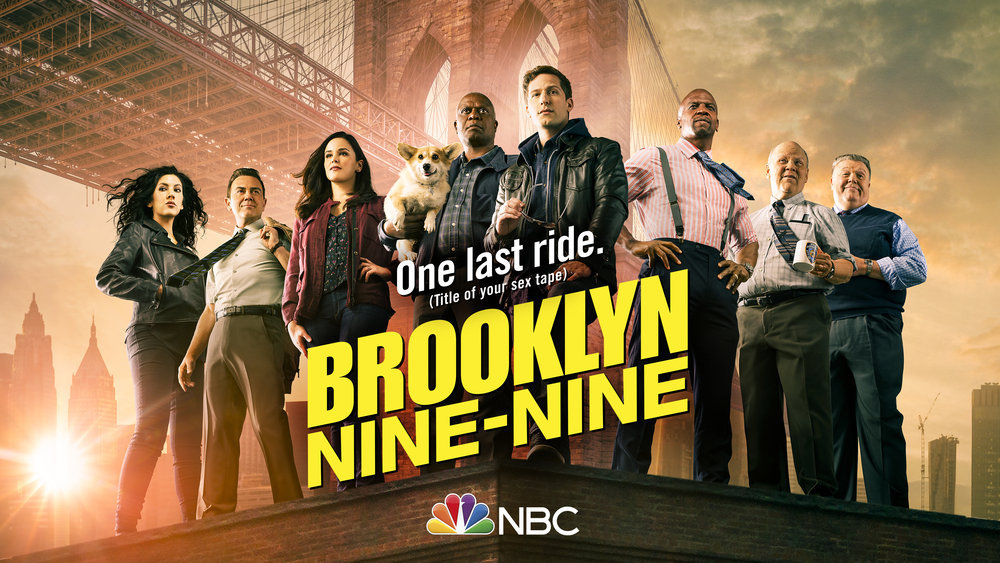After George Floyd’s murder last May and subsequent mainstreaming of the #BlackLivesMatter movement, it became awfully apparent to me just how little non-Black folks (myself included) understand police brutality and how deeply American media has worshipped cop shows since the 50s, not long after televisions became common. It’s no secret these programs were essentially propaganda to make the public more at ease with our finest “boys in blue.” For every “bad apple” in the force abusing, intimidating, and/or coercing their detainee, there was a “good cop” at the center of the story who just wanted to make the world a better place. From law and courtroom dramas, hospital to firehouse shows, much of the media we consume is inherently designed to pacify our attitudes towards the systems that were never meant to serve our marginalized communities.
For a long time, I believed Brooklyn 99 was a different kind of cop show. Sure, it centered Jake Peralta (Andy Samberg), a cis white man as its protagonist. The story portrayed him as a morally upright police detective who just wanted to do right by the people of New York. But he was also funny, child-like, and approachable. Not to mention that he was surrounded by the kind of diverse cast no other police procedural in history could boast, including Andre Braugher’s Raymond Holt, the gay Black commanding officer of the 99th Precinct; Terry Crews Terry Jeffords, a Black lieutenant, and Melissa Fumero’s Amy Santiago and Stephanie Beatriz’s Rosa Diaz, both Latina detectives (not to mention Diaz comes out as bisexual in Season 5!).
From its first season to its seventh, it was easy for me to sit back and enjoy the group’s hilarious exploits, like their elaborate holiday heists that always offered intrigue, betrayals, and surprise reveals. The romance blossoming between Jake and Amy was both frustrating to watch and achingly heartfelt. Brooklyn 99 offered carefully nuanced and necessary takes on sexual assault, homophobia, and racial profiling of Black folks by police. I even loved the way they solved cases as a team and always caught the bad guy, making the divide between good and bad people, criminals and cops, so simple, so obvious (at least in the eyes of the police telling the story).

Yet to call Brooklyn 99 a “good” cop show isn’t as simple as it seems. After the murder of George Floyd, cops and the shows that portrayed them faced a lot of well-earned scrutiny. Brooklyn 99 was just one of many series to experience an identity crisis during its latest (and for B99, its last) season.
The writing team ended up scrapping four previously written episodes, setting out to make a final season that would strike the balance between humor and the seriousness of police brutality, that would acknowledge the fears of its viewers who had become much warier of policing, corruption, and “protection.”
Throughout Season 8, we saw Rosa Diaz quit the police force to become a private investigator working pro bono for victims of police harassment and brutality. We saw Terry and Captain Holt struggle to operate as Black officers when the system they work for is first meant to work against them. Holt even forms a police reform commission. In episode six “The Set Up,” I was surprised but intrigued when Jake not only tailed and intimidated an innocent civilian but also got punished for it with a month-long suspension. Notably, the episode makes it clear this only happens because Jake took full responsibility; otherwise, it’s nearly impossible to jump through state and local laws, union contracts, and civil service commissions in order to fire, let alone punish, a cop who maintains his innocence or the necessity of his actions—and up until now, Brooklyn 99 had never acknowledged this level of police force corruption.

But even with these important changes, even with the familiar and wacky comedic moments shared among the characters I love, it didn’t feel like the same show it used to be. Serious moments felt so delicate, so careful that it ended up saying very little about the issues at hand. And when it turned completely to comedy, it became meaningless and trivial. Just because I loved these characters didn’t mean I could forget their part in a broken system, no matter how kind, funny, and human they seemed out of uniform.
Even Jake resigning from the police force in the season finale wasn’t as satisfying as it could’ve been. While he did question the ultimate purpose of policing in the first episode, he ends up turning in his badge to spend more time with his son, not because of the corruption he’s become aware of, which would’ve fallen more in line with the season’s initial purpose. And when it all came to a close and I saw the title card at the end, knowing no other episodes would ever be released again, I felt relief rather than loss.
Believe me, I wanted to enjoy this last season. I wanted to see this show become what it should’ve been from the start. But I can’t consider Brooklyn 99 a “good” cop show anymore – there’s no such thing, just as there are no “good” cops who exist in real life, only imperfect people acting in a fundamentally flawed institution.

